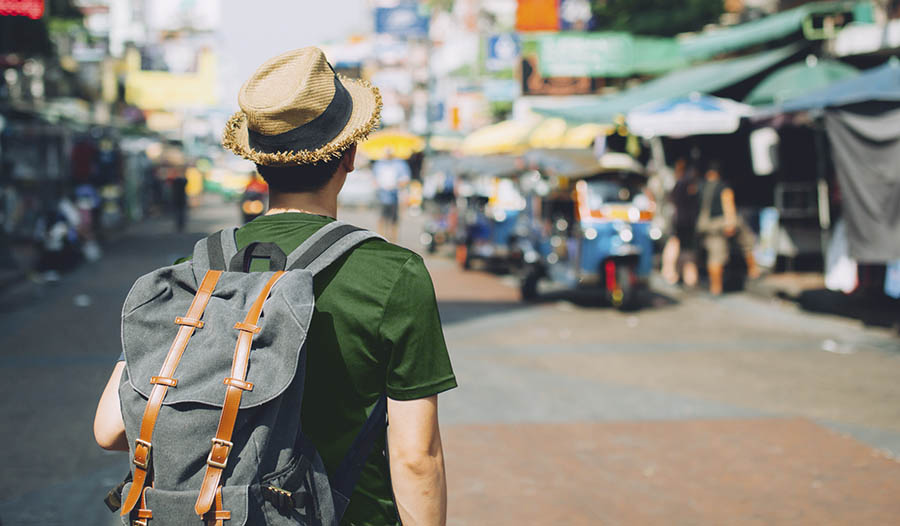How to Stay Healthy While Traveling + Supplements to Take with You
DISCLAIMER:This blog does not intend to provide diagnosis...
- In this article:
- Bring pillows and blankets along for the ride
- Prepare for motion sickness
- Protect against viruses
- Stretch whenever possible
- Hydrate, hydrate, hydrate!
- Pack healthy snacks

Whether by car, train, bus or airplane, traveling can take a lot out of you. Not only does it present some discomforts—like sitting in one place (typically an uncomfortable seat) for a prolonged period of time—but it can also bring about some health challenges. Traveling, in general, means being away from home, which translates to different food, different living quarters, and often a different daily routine. Jet lag can also dampen travel plans as time changes affect sleep patterns and energy.
Digestive issues, including constipation, abdominal pain and reflux, are common for travelers. Additionally, for those who visit popular tourist destinations that require a great deal of walking, fatigue, leg cramps, heat intolerance and heat exhaustion are common complaints. Changing climates or temperatures can also affect immune function. Lastly, the demands of traveling are tough on all of us—the pressure to participate in certain activities, appease certain family members or live under certain circumstances. Needless to say, it’s quite easy to get off track with your health plans while traveling.
Here are some tips and tricks I prescribe to those planning to take a weekend, weeklong or several weeks-long trip to ensure they stay healthy and energized and make a safe return home.
Bring pillows and blankets along for the ride
Your method of travel doesn’t really matter—it’s all pretty much uncomfortable, which is why I recommend bringing along a neck pillow for support and a blanket in case the environment is chilly. If you’re traveling with children, always bring extra! And for nursing mamas, don’t forget your nursing pillow. It will come in handy during feedings.
Prepare for motion sickness
Motion sickness is another side effect of travel. I often carry ginger lozenges, which serve as an all-natural anti-nausea medicine. Additionally, aromatherapy can work wonders, specifically peppermint oil, as this invigorating scent can help stave off motion sickness. Lemongrass oil can also help nausea. Essential oils work well with children, and they are easy to apply and to carry.
Protect against viruses
Exposure to germs increases with travel. Hand washing is a key preventive tool to keep germs away and prevent the spreading of common viral illnesses. Hand sanitizer is not ideal but a good option for travel. Additionally, I always travel with astragalus root, an immune-boosting herb I keep in my medicine cabinet. I give my family one dropperful 3x per day at the first sign of illness (discontinuing if there’s a fever). High dose vitamin C is also helpful in preventing viral illnesses.
Stretch whenever possible
To prevent body aches and pains from prolonged sitting, move about and stretch at regular intervals whenever possible. I always recommend doing so before you hit the road to loosen your muscles and prepare them for the journey ahead. If you do happen to feel muscle tension while traveling, rub a little magnesium oil directly into the area, even the bottoms of your feet. Epsom salts, which are also high in magnesium, can also relax sore muscles. You can mix the two together to create a magnesium-rich foot soak to help you fall asleep.
Hydrate, hydrate, hydrate!
For some reason, we seem to forget to drink the amount of water our body needs while traveling, which is why I always bring along a reusable water bottle to ensure I’m getting my fair share (at least 64 ounces a day). Here’s a tip: adding some lemon and a touch of salt to your H2O can help the digestive system and balance your electrolytes.
Pack healthy snacks
Let’s face it—most of the foods at convenience stores won’t have a diverse range of nutritious foods and beverages. Pack snacks ahead of time that are healthy and easy to carry, like nut butter sandwiches, fruit, cut veggies, and turkey and hummus roll-ups are some of my favorites.

 By Dr. Taz Bhatia, M.D.
By Dr. Taz Bhatia, M.D.


